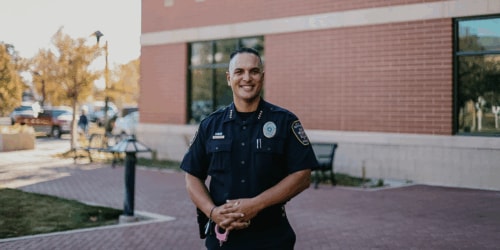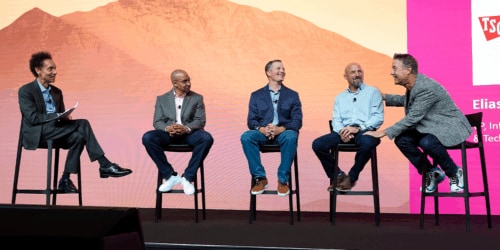As National Disability Employment Awareness Month draws to a close, I want to talk about how important it is to acknowledge and celebrate — all year long — the countless contributions of America’s workers with disabilities. And with a son who was physically impacted a few years ago by a severe skiing accident, along with a cousin who is Deaf, I have a personal connection to disability. Through them and others, I recognize the challenges that exist for these individuals and the incredible value that they can add to any company’s team.
I read a really compelling stat that underscored how untapped the disabled workforce is: If just 1 percent of the 10.7 million working-age people with disabilities in the U.S. who are available to join the workforce started jobs, the influx would boost America’s GDP by a massive $25 billion! Here’s why: Disability drives innovation.
Think about it. People with disabilities conquer hurdles every day that other folks might never consider. They navigate a world that isn’t necessarily built for them, and they do so by applying a combination of creativity, agility, resilience, perseverance and willingness to experiment. That makes them natural, intuitive innovators who companies like Microsoft, IBM, Salesforce, Dell and many others have attracted through dedicated “ability hiring” initiatives. In fact, companies that qualify as “champions” on the Disability Equality Index — meaning they are committed to strengthening the bridge between business and the disability communities — achieved on average 28% higher revenue over a four-year period, double the net income and 30% higher economic profit margins.
T-Mobile is one of those Diversity, Equity and Inclusion champions because we encourage our employees to bring their unique differences to work every day. And, by the way, this makes good business sense. Those differences make us collectively smarter, stronger and more customer-centric. As persons with disabilities are the third-largest market segment in the U.S. after Hispanics and African Americans, we need to have a workforce that understands, reflects and support their needs. This is where our amazing group of 11,000 employees who are part of our Accessibility Community at T-Mobile, or ACT, comes in. These employees — some with disabilities, others who are friends, family or allies of those with disabilities — remind us of the doors that open when we’re inclusive.
This is foundational to our culture at T-Mobile, just as it was at Sprint for many, many years. In fact, this year Sprint Accessibility, a team that develops, markets and distributes communication products and services for customers who are Deaf, DeafBlind (Deaf and Blind), have hearing or vision loss or cognitive, speech or mobility disabilities, celebrated its 30-year anniversary! Impressive, especially when you consider that the Americans with Disabilities Act — the landmark decision that mandated that states provide reasonable services and accommodations for people with disabilities — is the same age.
Many employees of what is now the T-Mobile Accessibility team following our merger are themselves people with disabilities — employees like Ken Arcia, a customer relations manager for T-Mobile. Ken, who is Deaf/Hard of Hearing, provides accessibility solutions to customers and state agencies in Arizona, Nevada and North Dakota. He also showcases T-Mobile’s products for those who are Deaf/Hard of Hearing at trade shows around the country. And Hannah Defelice, a Blind/Low-Vision customer relationship manager who herself is DeafBlind. They are proud to share their stories with the wider world, Ken as a frequent guest speaker at schools and colleges and Hannah as a paratriathlete.
Both use T-Mobile accessibility products and services like IP Relay and CapTel for work and personal communication. And they achieve meaningful connections with their colleagues and customers in the disabled community simply by being who they are, true assets to our company culture and our business. As Ken likes to point out, SMS messaging, aka texting, was originally developed for the Deaf/Hard of Hearing community. How’s that for an accessibility innovation that the entire world has embraced?!
Yet there is still so much more we can do to be better. To further our inclusive hiring and work-culture practices, our recently-announced External Diversity and Inclusion Council is helping us align to best practices that support diverse employees and customers. And our internal Diversity Recruiting Team is expanding T-Mobile’s partnership with the experts at Disability:IN by joining their Inclusion Works program, which provides us with customized consulting to expand our culture of inclusion and develop a sustainable recruitment strategy.
In addition to our many efforts at T-Mobile to champion disability inclusion, we won’t stop listening, learning and growing. I’ve discovered that expressing our individuality is what connects us with others. Let’s ensure we’re creating company cultures that value the kind of unique perspectives that broaden opportunities not only in our workplaces, but also our world.



